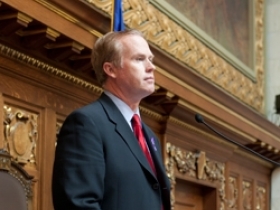How Former Lawmakers Cash In
16 ex-lawmakers -- including former Assembly speakers and Senate majority leaders -- make big money lobbying the legislature.

Jeff Fitzgerald
Until recently, Jeff Fitzgerald held one of the most powerful positions in Wisconsin government, as speaker of the state Assembly. He didn’t seek re-election last year because he ran for U.S. Senate, coming in fourth among four Republican primary contenders. His tenure as a legislator officially ended on Jan. 7.
Two days later, on Jan. 9, the state Government Accountability Board issued Fitzgerald a license to lobby.
He now represents a half-dozen interest groups, including Alliant Energy, which spent $194,000 on lobbying in the 2011-12 legislative session; School Choice Wisconsin, which supports public spending on private schools and has another former Assembly speaker, John Gard, on its lobby payroll; and the Wisconsin Council for Independent Education, which represents for-profit colleges.
The state’s current roster of more than 500 lobbyists includes at least 16 former legislators. Many of them, like Fitzgerald and Gard, were legislative leaders, including fellow former speakers Scott Jensen, Walter Kunicki and Mike Sheridan, and former Senate majority leaders Joe Strohl and Mary Panzer.
Jay Heck, a longtime observer of state government who heads the nonpartisan Common Cause in Wisconsin, thinks former leaders gravitate to lobbying because of their strong ties with both “folks in the lobbying world” and other legislators. “Lobbying is all about relationships,” he says.
Wisconsin law currently bars former state agency officials from lobbying their former departments for 12 months after leaving state service. They can still work for and advise companies that do so; they just can’t have direct contact.
Repeated efforts have been made to extend a similar rule to former lawmakers. The current incarnation, SB 33, would impose a 24-month waiting period. The bill has 12 co-sponsors, including one Republican, state Rep. Ed Brooks of Reedsburg.
“It’s technically bipartisan,” notes state Sen. John Lehman, D-Racine, the bill’s lead sponsor.
Lehman acknowledges that former lawmakers can be effective lobbyists, and is fine with that. He just wants a “cooling off period” before such transitions occur. “It’s important for people to run for public office and hold public office without looking for a career as a lobbyist.”
The bill’s lead Assembly sponsor, state Rep. Dana Wachs, D-Eau Claire, agrees, saying in a statement: “We must focus on creating jobs for others, not ourselves.”
Rep. Brooks is less astringent: “I just think it’s a good bill. It kind of makes sense.”
According to the National Conference of State Legislatures, more than 30 states make lawmakers wait, usually a year or two, before becoming lobbyists. The move to bring Wisconsin into this fold is backed by Common Cause and the nonpartisan Wisconsin Democracy Campaign, whose executive director, Mike McCabe, warns of letting “service in the Legislature essentially become a training ground for a lobbying career.”
The Wisconsin State Journal, in an editorial on Fitzgerald’s job change, wondered whether current lawmakers might be influenced to act contrary to the public interest “by the promise of a lucrative lobbying job.”
What do the state’s lawmakers-turned-lobbyists have to say about this issue? Are they willing to defend their right to go from making laws to making money off of their connections?
Apparently not.
Jeff Fitzgerald did not respond to requests for comment. Likewise avoiding this opportunity were former state Sens. Panzer, Bob Welch and Ted Kanavas, and former state representatives Sheridan, Steve Foti and Tim Hoven, all of whom became lobbyists within two years of leaving office.
“There’s going to be bills like this that come and go,” Kanavas said. “I don’t have any thoughts on it.”
Jeff’s brother, Scott Fitzgerald, the current Senate majority leader, also took a pass. “Senator Fitzgerald has not had a chance to review this legislation,” said his spokesman, Tom Evenson.
The nonprofit Wisconsin Center for Investigative Journalism (www.WisconsinWatch.org) collaborates with Wisconsin Public Radio, Wisconsin Public Television, other news media and the UW-Madison School of Journalism and Mass Communication. This story was a produced in collaboration with Wisconsin Public Television.
All works created, published, posted or disseminated by the Center do not necessarily reflect the views or opinions of UW-Madison or any of its affiliates.
-
Legislators Agree on Postpartum Medicaid Expansion
 Jan 22nd, 2025 by Hallie Claflin
Jan 22nd, 2025 by Hallie Claflin
-
Inferior Care Feared As Counties Privatize Nursing Homes
 Dec 15th, 2024 by Addie Costello
Dec 15th, 2024 by Addie Costello
-
Wisconsin Lacks Clear System for Tracking Police Caught Lying
 May 9th, 2024 by Jacob Resneck
May 9th, 2024 by Jacob Resneck

















